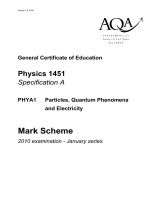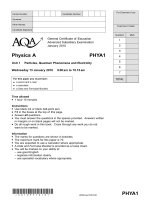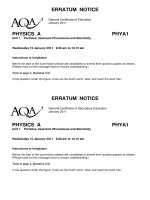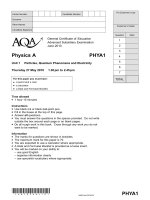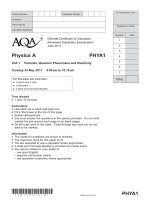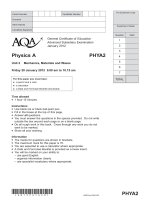- Trang chủ >>
- Khoa Học Tự Nhiên >>
- Vật lý
Vật lý A level:AQA PHYA2 w QP JUN11
Bạn đang xem bản rút gọn của tài liệu. Xem và tải ngay bản đầy đủ của tài liệu tại đây (580.02 KB, 16 trang )
(JUN11PHYA201)
WMP/Jun11/PHYA2
PHYA2
Centre Number
Surname
Other Names
Candidate Signature
Candidate Number
General Certificate of Education
Advanced Subsidiary Examination
June 2011
Time allowed
l
1 hour 15 minutes
Instructions
l
Use black ink or black ball-point pen.
l
Fill in the boxes at the top of this page.
l
Answer all questions.
l
You must answer the questions in the spaces provided. Do not write
outside the box around each page or on blank pages.
l
Do all rough work in this book. Cross through any work you do not
want to be marked.
Information
l
The marks for questions are shown in brackets.
l
The maximum mark for this paper is 70.
l
You are expected to use a calculator where appropriate.
l
A Data and Formulae Booklet is provided as a loose insert.
l
You will be marked on your ability to:
– use good English
– organise information clearly
– use specialist vocabulary where appropriate.
For this paper you must have:
l
a pencil and a ruler
l
a calculator
l
a Data and Formulae Booklet.
Physics A PHYA2
Unit 2 Mechanics, Materials and Waves
Monday 6 June 2011 1.30 pm to 2.45 pm
MarkQuestion
For Examiner’s Use
Examiner’s Initials
TOTAL
1
2
3
4
5
6
7
WMP/Jun11/PHYA2
Do not write
outside the
box
Answer all questions in the spaces provided.
1 A boy throws a ball vertically upwards and lets it fall to the ground. Figure 1 shows
how displacement relative to the ground varies with time for the ball.
Figure 1
1 (a) (i) State which feature of a displacement-time graph represents the velocity.
(1 mark)
1 (a) (ii) On the axes below, draw the shape of the velocity-time graph for the ball between
t
0
and t
2
. The starting point is labelled X.
(3 marks)
(02)
2
displacement
ground level
t
0
t
1
t
2
time
t
0
t
1
t
2
velocity
X
0
time
WMP/Jun11/PHYA2
Tur n over
ᮣ
(03)
Do not write
outside the
box
1 (b) Figure 2 shows the ball deforming as it contacts the ground, just at the point where it is
stationary for an instant and has reached maximum deformation.
Figure 2
1 (b) (i) Explain how Newton’s third law of motion applies to Figure 2.
(2 marks)
1 (b) (ii) Explain why there is a resultant upward force on the ball in Figure 2.
(2 marks)
Turn over for the next question
3
8
centre of mass
WMP/Jun11/PHYA2
Do not write
outside the
box
4
(04)
2 A student measures the acceleration due to gravity, g, using the apparatus shown in
Figure 3. A plastic card of known length is released from rest at a height of 0.50 m
above a light gate. A computer calculates the velocity of the card at this point, using the
time for the card to pass through the light gate.
Figure 3
2 (a) The computer calculated a value of 3.10 ms
–1
for the velocity of the card as it travelled
through the light gate. Calculate a value for the acceleration due to gravity, g, from
these data.
answer = ms
–2
(2 marks)
2 (b) The student doubles the mass of the card and finds a value for g that is similar to the
original value. Use the relationship between weight, mass and g to explain this result.
(1 mark)
plastic card
light gate
interface
computer
WMP/Jun11/PHYA2
Do not write
outside the
box
5
Tur n over
ᮣ
(05)
2 (c) State and explain one reason why the card would give more reliable results than a table
tennis ball for this experiment.
(2 marks)
Turn over for the next question
5
WMP/Jun11/PHYA2
Do not write
outside the
box
6
(06)
3 Figure 4 shows a rollercoaster train that is being accelerated when it is pulled
horizontally by a cable.
Figure 4
3 (a) The train accelerates from rest to a speed of 58 ms
–1
in 3.5 s. The mass of the fully
loaded train is 5800 kg.
3 (a) (i) Calculate the average acceleration of the train.
answer = ms
–2
(2 marks)
3 (a) (ii) Calculate the average tension in the cable as the train is accelerated, stating an
appropriate unit.
answer =
(3 marks)
cable
pulling
force
rollercoaster
train
WMP/Jun11/PHYA2
(07)
Do not write
outside the
box
7
Tur n over
ᮣ
3 (a) (iii) Calculate the distance the train moves while accelerating from rest to 58 ms
–1
.
answer = m
(2 marks)
3 (a) (iv) The efficiency of the rollercoaster acceleration system is 20%.
Calculate the average power input to this system during the acceleration.
answer = W
(3 marks)
3 (b) After reaching its top speed the driving force is removed and the rollercoaster train
begins to ascend a steep track. By considering energy transfers, calculate the height that
the train would reach if there were no energy losses due to friction.
answer = m
(3 marks)
13
WMP/Jun11/PHYA2
Do not write
outside the
box
8
(08)
4 Horses were once used to power machinery in factories, mines and mills.
Figure 5 shows two horses attached to a beam which turns a wheel. This wheel drives
machinery.
Figure 5
4 (a) Each horse exerts a force of 810 N and the length of the beam is 7.3 m.
4 (a) (i) Define the moment of a couple.
(2 marks)
4 (a) (ii) Calculate the moment of the couple exerted by the horses, stating an appropriate unit.
answer =
(2 marks)
beam
pivot
wheel
horse
horse
7.3 m
810
N
810 N
WMP/Jun11/PHYA2
Do not write
outside the
box
4 (b) The horses move at a constant speed of 0.91 ms
–1
. Calculate the combined power
output of the two horses. Give your answer to an appropriate number of significant
figures.
answer = W
(3 marks)
4 (c) During the Industrial Revolution in the 19
th
Century, James Watt became well known
for developing and improving steam engines to replace horses. He defined the unit of
power called ‘horsepower’ by studying a system similar to the one shown in Figure 5.
Suggest why Watt decided to use horsepower as a unit of power.
(1 mark)
Turn over for the next question
9
Tur n over
ᮣ
(09)
8
WMP/Jun11/PHYA2
Do not write
outside the
box
5 (a) The speed of light is given by
c = f
λ
State how each of these quantities will change, if at all, when light travels from air to
glass.
c
f
λ
(3 marks)
Figure 6 shows a side view of a step index optical fibre.
Figure 6
5 (b) Ray A enters the end of the fibre and then undergoes total internal reflection.
On Figure 6 complete the path of this ray along the fibre.
(2 marks)
5 (c) (i) The speed of light in the core is 2.04 × 10
8
ms
–1
. Show that the refractive index of the
core is 1.47.
(2 marks)
5 (c) (ii) Show that the critical angle at the boundary between the core and the cladding is
about 80°.
refractive index of the cladding = 1.45
(2 marks)
10
(10)
light rays in air
cladding
core
not drawn to scale
B
A
θ
cladding
WMP/Jun11/PHYA2
Do not write
outside the
box
5 (d) Ray B enters the end of the fibre and refracts along the core-cladding boundary.
Calculate the angle of incidence,
θ
, of this ray at the point of entry to the fibre.
answer = degrees
(3 marks)
5 (e) Figure 7 shows a pulse of monochromatic light (labelled X) that is transmitted a
significant distance along the fibre. The shape of the pulse after travelling along the
fibre is labelled Y. Explain why the pulse at Y has a lower amplitude and is longer than
it is at X.
Figure 7
(2 marks)
11
Tur n over
ᮣ
(11)
14
X Y
optical fibre
WMP/Jun11/PHYA2
Do not write
outside the
box
6 The table below shows the results of an experiment where a force was applied to a
sample of metal.
6 (a) On the axes below, plot a graph of stress against strain using the data in the table.
(3 marks)
6 (b) Use your graph to find the Young modulus of the metal.
answer = Pa
(2 marks)
12
(12)
strain
0 1.00 2.00 3.00 4.00 5.00 6.00 7.00 8.00 9.00 10.00
/10
–3
stress
0 0.90 2.15 3.15 3.35 3.20 3.30 3.50 3.60 3.60 3.50
/10
8
Pa
strain / 10
–3
stress
/
10
8
Pa
WMP/Jun11/PHYA2
Do not write
outside the
box
6 (c) A 3.0 m length of steel rod is going to be used in the construction of a bridge. The
tension in the rod will be 10 kN and the rod must extend by no more than 1.0 mm.
Calculate the minimum cross-sectional area required for the rod.
Young modulus of steel = 1.90 × 10
11
Pa
answer = m
2
(3 marks)
Turn over for the next question
13
Tur n over
ᮣ
(13)
8
WMP/Jun11/PHYA2
(14)
Do not write
outside the
box
7 A scientist is going to use a double-slit arrangement to carry out measurements in order
to determine the wavelength of light from a laser.
Figure 8
7 (a) The scientist has a double slit of known separation. Describe the measurements that
need to be taken and explain how they are used to find the wavelength of the light.
Discuss any necessary safety precautions and how you would arrange the apparatus to
improve accuracy.
The quality of your written communication will be assessed in this question.
(6 marks)
14
double slit
laser
screen
WMP/Jun11/PHYA2
(15)
14
Do not write
outside the
box
7 (b) In 1802 Thomas Young used candle light to observe the interference pattern from two
narrow slits acting as coherent light sources.
Explain what is meant by coherent light sources.
(2 marks)
7 (c) Sketch and label on the diagram below the arrangement that Young would have used to
obtain his interference pattern.
(2 marks)
7 (d) State two differences in the appearance of the pattern obtained with a laser and that
produced by a white light source such as a candle.
Difference 1
Difference 2
(2 marks)
7 (e) Explain how the wave theory of light accounts for the areas on the screen where the
intensity is a minimum.
(2 marks)
END OF QUESTIONS
15
candle
screen
WMP/Jun11/PHYA2
(16)
Do not write
outside the
box
16
There are no questions printed on this page
DO NOT WRITE ON THIS PAGE
ANSWER IN THE SPACES PROVIDED
Copyright © 2011 AQA and its licensors. All rights reserved.
